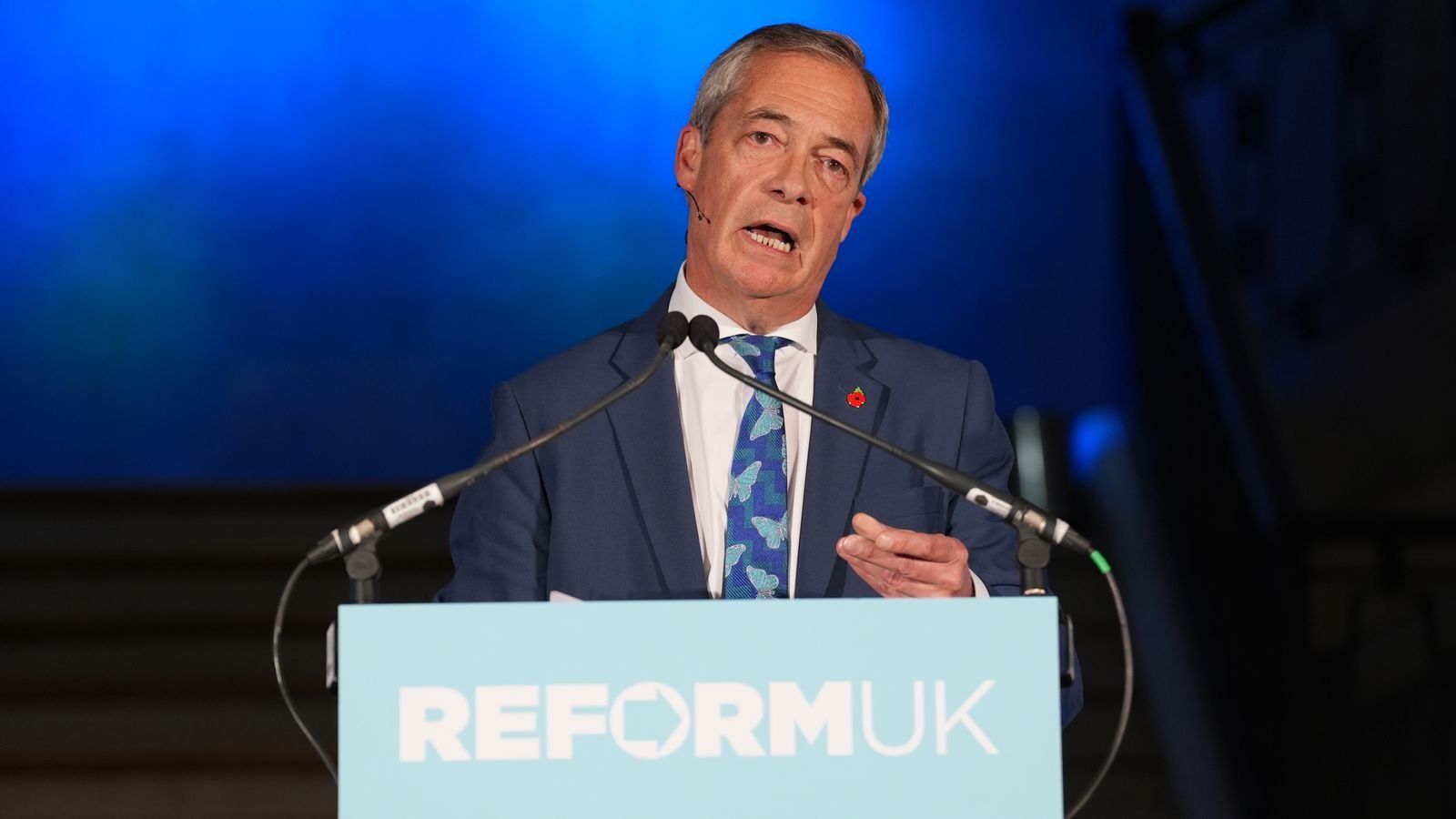Nigel Farage has stated that Reform UK may consider reducing the minimum wage for young people, arguing that it may currently be «too high.»
During a news conference, he also admitted that his previous manifesto promises to implement significant tax cuts were merely «aspirations» and that implementing «substantial tax cuts» is not feasible.
In defense of his party, Mr. Farage emphasized that Reform UK is not solely led by him and that he is assembling a team with expertise in various policy areas.
Politics latest: Home secretary to make statement about stabbing attack
The Reform UK leader made these remarks during a speech and news conference in the City of London, where he pledged that his party would be «the most pro-business, the most pro-entrepreneurship government that has been seen in this country in modern times.»
When asked during the news conference if he believes the minimum wage is too high, Mr. Farage responded, «There’s an argument that the minimum wage is too high for younger workers, especially considering that we’ve lowered the threshold for employers’ national insurance to £5,000 a year.»
This refers to Chancellor Rachel Reeves’s decision to decrease the threshold at which employers begin paying national insurance contributions from £9,100 to £5,000 per year.
Making the case that this change places too heavy a tax burden on businesses, hindering growth, Mr. Farage urged the chancellor to «do one or the other – either raise the NI cap or lower the minimum wage for younger workers.»
The current hourly national minimum wage is £7.55 for apprentices and those under 18, £10 for 18-20 year olds, and £12.21 for those aged 21 and over.
Read more:
Badenoch marks first year as Tory leader
Minister rules out airport-style security at train stations
Manifesto tax cuts ‘only ever aspirations’
However, Mr. Farage is facing criticism for backtracking on the tax cuts promised in Reform UK’s 2024 general election manifesto, titled «Our Contract With You.»
The manifesto included measures such as increasing the income tax threshold to £20,000, raising the higher rate threshold to £70,000, eliminating stamp duty for properties under £750,000, and removing taxes on inheritances below £2m.
But in his recent statements, Mr. Farage clarified, «We do want to reduce taxes. That’s a given.»
However, we acknowledge that significant tax cuts are not feasible given the current state of debt and finances,» he said. He mentioned plans to make modest changes immediately, such as eliminating inheritance tax on family farms and family businesses, as well as adjusting tax thresholds. When asked if he was deviating from his promises to align with mainstream economic thinking, the Reform UK leader clarified that the promises in the 2024 manifesto were aspirational and the adjustments made were in response to the economic reality.
Mr. Farage emphasized that the Reform UK project is not solely his own, mentioning new team members who will cover various policy areas. He also stated that he is not yet ready to announce who his chancellor or other top cabinet roles would be in a potential Reform government.
In response to Mr. Farage’s speech, a Labour Party spokesperson criticized his proposed austerity measures, while a Conservative shadow chancellor expressed skepticism about Reform UK’s economic policy, stating that it appeared to be in chaos. Nigel Farage has suggested that Reform UK may consider reducing the minimum wage for young people, arguing that it might currently be «too high.» During a news conference, he acknowledged that his party’s promises to implement significant tax cuts in the previous general election were merely «aspirations» and that substantial tax reductions are not feasible. Farage emphasized that Reform UK is not solely reliant on him and is in the process of assembling a team with expertise in various policy areas.
In his speech and press briefing in the City of London, Farage pledged that Reform UK would form the most business-friendly and entrepreneurial government in modern British history. When asked about his views on the minimum wage, Farage responded by suggesting that the minimum wage might be too high for younger employees, particularly in light of the reduced threshold at which employers begin paying national insurance contributions.
Referring to Chancellor Rachel Reeves’s decision to lower the threshold for NIC payments, Farage argued that this places excessive tax burdens on businesses, hindering growth. He urged the chancellor to either raise the NIC cap or lower the minimum wage for younger workers. The current hourly national minimum wage varies from £7.55 for apprentices and under 18s, £10 for 18-20 year olds, to £12.21 for those aged 21 and above.
Farage’s comments have sparked accusations of backtracking on the tax cuts outlined in Reform UK’s 2024 general election manifesto. Despite the pledges made in «Our Contract With You,» including increasing the income tax threshold and abolishing stamp duty for lower-value properties, Farage now claims that tax cuts remain a priority for the party. «We acknowledge that significant tax cuts are not feasible at this time, given the urgent need to address our debt and financial challenges,» stated the Reform UK leader. He went on to outline some minor adjustments that would be implemented immediately, such as eliminating inheritance tax on family farms and family businesses, as well as raising tax thresholds. However, specific details on the new thresholds were not provided.
When questioned by a journalist about veering away from his previous promises to align with mainstream economic thinking, the Reform UK leader clarified that the pledges made in the party’s 2024 manifesto were always considered aspirations. The adjustments being made now reflect a more pragmatic approach to the current economic situation.
Farage emphasized that the Reform UK project is not solely driven by him, but by a team of individuals who will be announced in the coming weeks to cover various policy areas. He stressed the importance of moving away from the perception of being a one-man show and highlighted key members of the team including David Bull, Lee Anderson, Richard Tice, Danny Kruger, and Zia Yusuf.
As for the future cabinet roles in a potential Reform government, Farage mentioned that he was not yet ready to disclose who his chancellor would be or the individuals who would fill other top positions.
In response to Farage’s speech, a Labour Party spokesperson criticized the proposed return to austerity measures and highlighted concerns about potential cuts to public services. The spokesperson also raised issues with Reform UK’s stance on minimum wage, foreign investments, and the impact on essential services like the NHS, schools, and pensions.
The Conservative shadow chancellor, Sir Mel Stride, expressed skepticism about Reform UK’s economic policies, noting a lack of clarity on which parts of the manifesto the party stands by. He raised doubts about the feasibility of Reform’s proposals and criticized the lack of a concrete plan in Farage’s speech.
Overall, the response to Farage’s announcements has been mixed, with some questioning the feasibility and coherence of Reform UK’s economic policies. Despite efforts to broaden the team and present a united front, concerns remain about the party’s approach to key economic issues and the lack of specificity in their proposals. Nigel Farage has said Reform UK could cut the minimum wage for young people, saying there is «an argument» that it is currently «too high». Speaking at a news conference, he also said his manifesto promises at the last general election to bring in sweeping tax cuts were «only ever aspirations», and «substantial tax cuts» are «not realistic». In a broader defence of his insurgent party, Mr Farage insisted Reform UK is «not a one-man band», and he is building a team with expertise across a wide range of policy areas. Politics latest: Home secretary to make statement about stabbing attack The Reform UK leader made the comments in a speech and news conference with journalists in the City of London in which he pledged the party would be «the most pro-business, the most pro-entrepreneurship government that has been seen in this country in modern times». Asked in the news conference afterwards if he believes the minimum wage is too high, Mr Farage replied: «There’s an argument that minimum wage is too high for younger workers, particularly given that we’ve lowered the level at which NIC [employers’ national insurance] is paid to £5,000 a year.» This is a reference to Chancellor Rachel Reeves’s decision at the last budget to reduce the threshold at which employers start paying national insurance contributions from £9,100 per year in salary to £5,000. Read more: Badenoch marks first year as Tory leader Minister rules out airport-style security at train stations Manifesto tax cuts ‘only ever aspirations’ But Mr Farage is also being accused of U-turning on the tax cuts he pledged in Reform UK’s 2024 general election manifesto, which was called «Our Contract With You». Key measures in the document included raising the minimum threshold of income tax to £20,000, raising the higher rate threshold from £50,271 to £70,000, abolishing stamp duty for properties below £750,000, and abolishing taxes on inheritances below £2m. But speaking on Monday, the Reform UK leader said: «We want to cut taxes. Of course, we do.»
SOURCE

